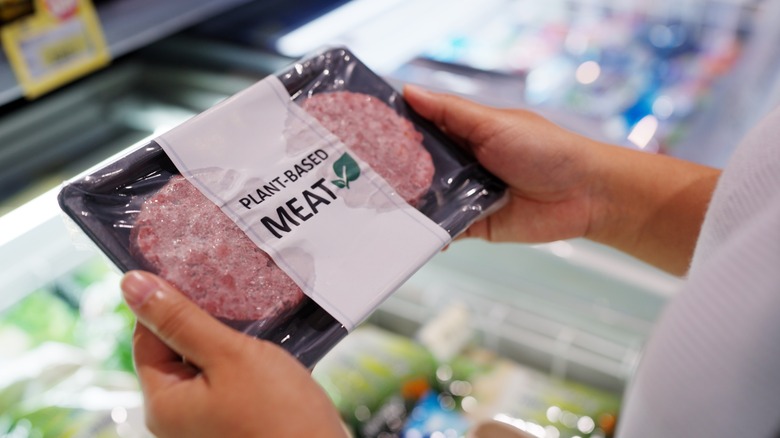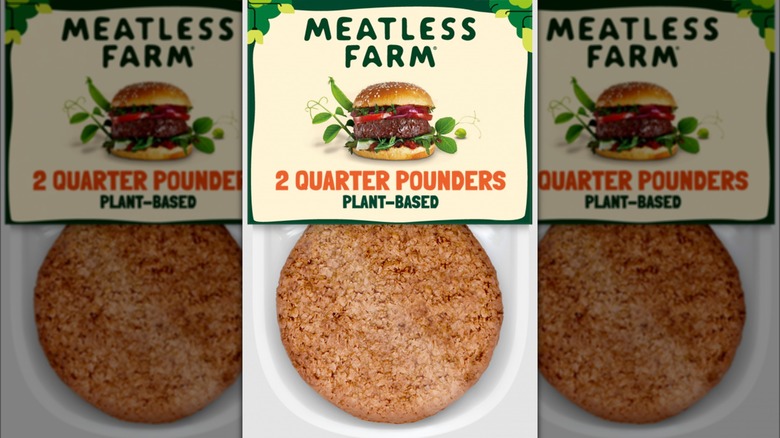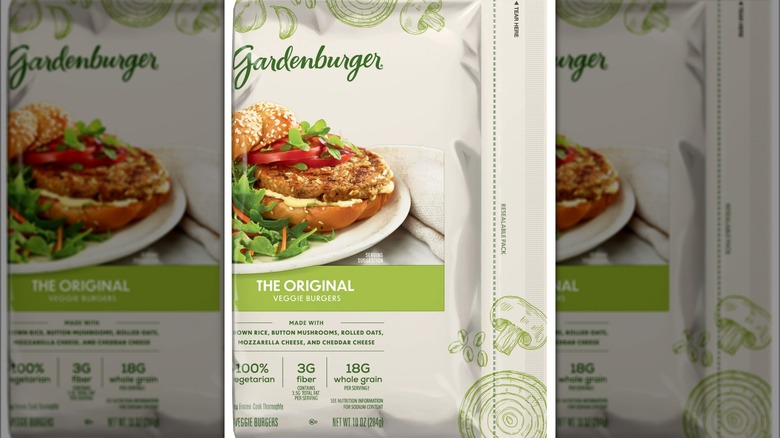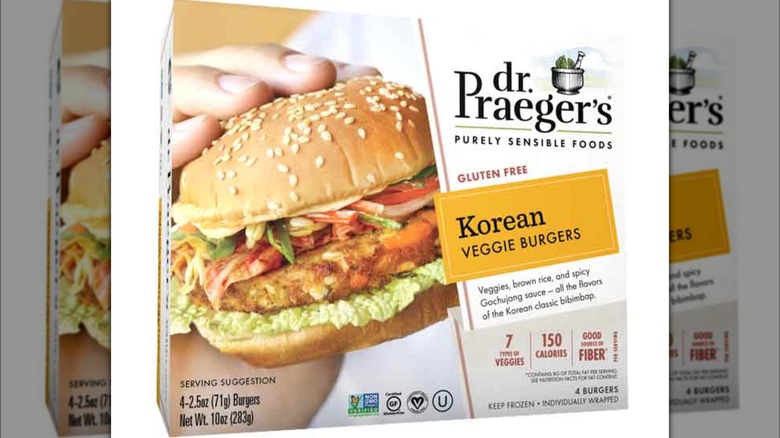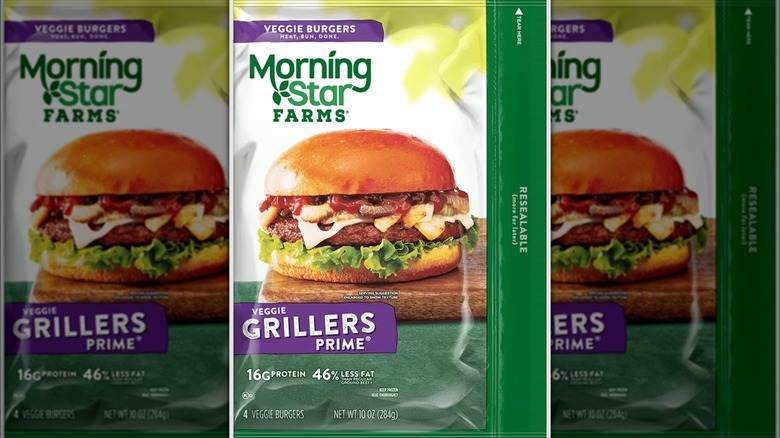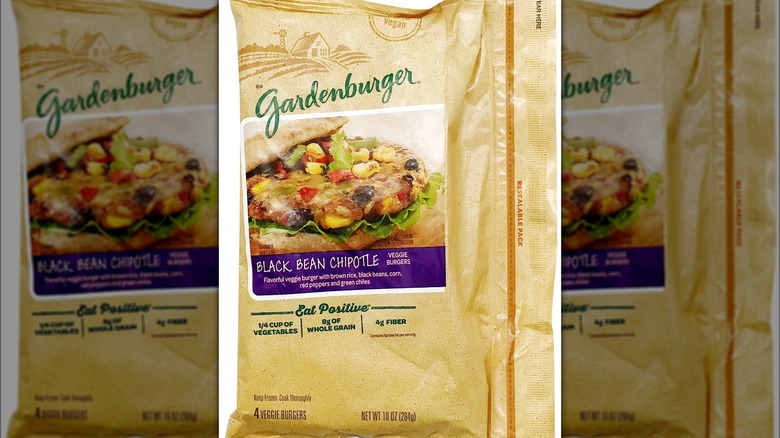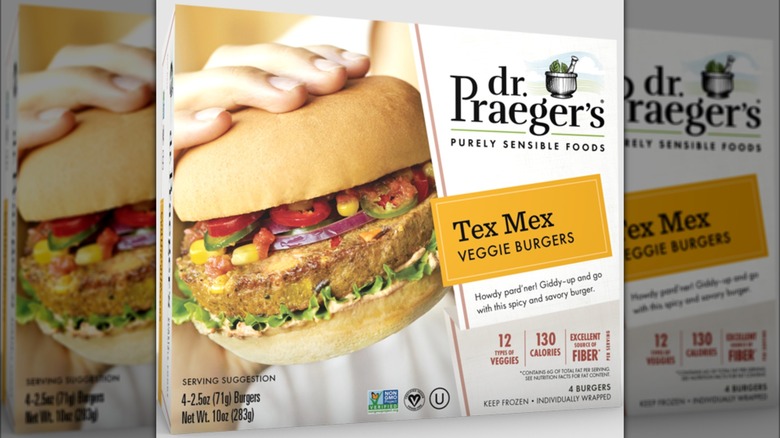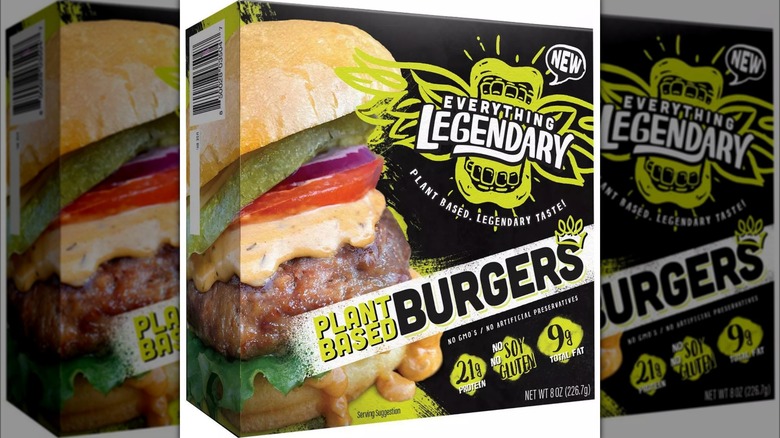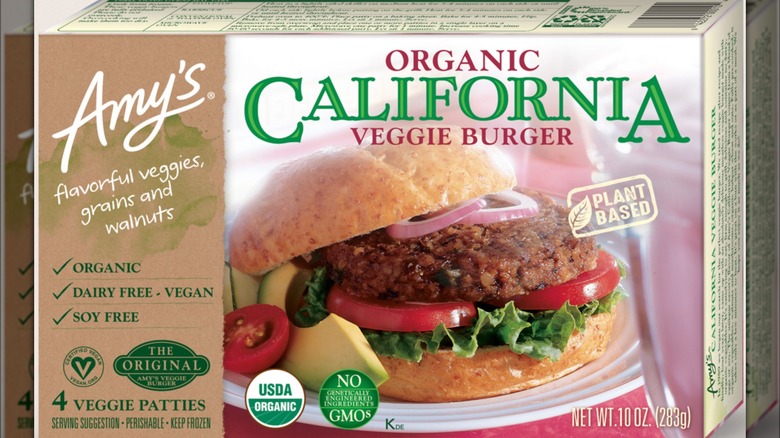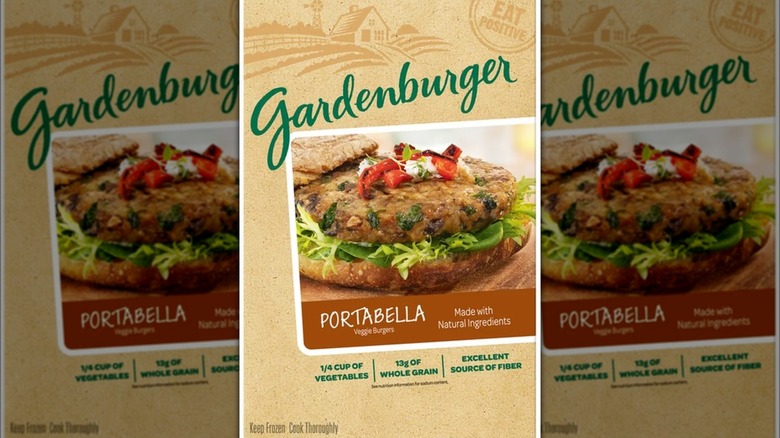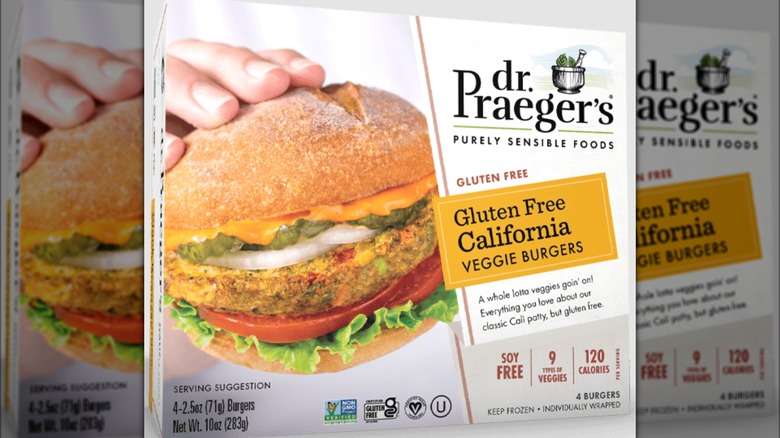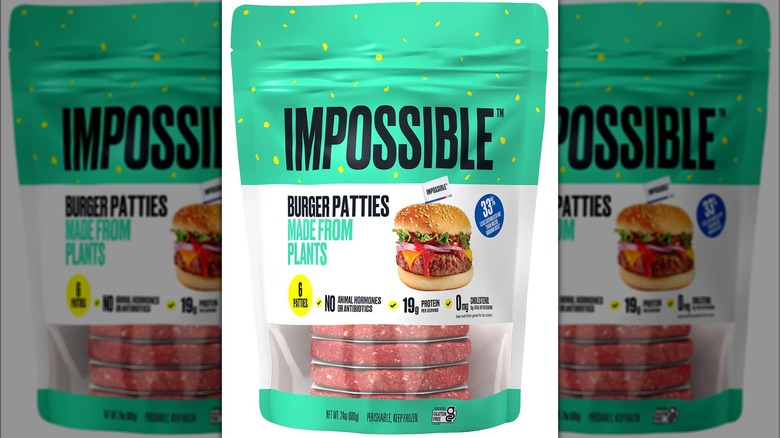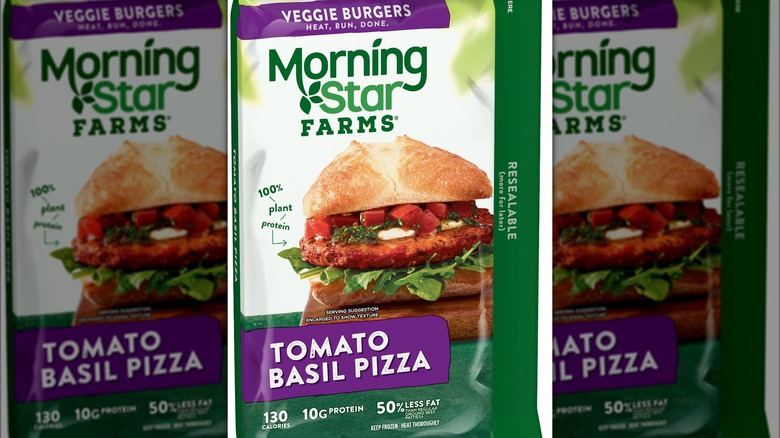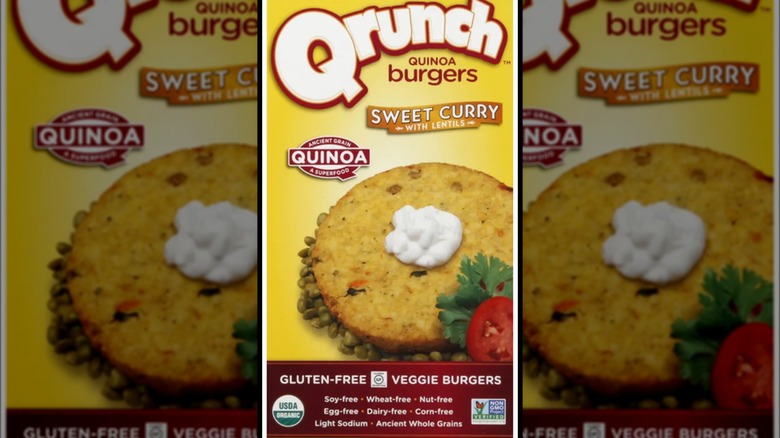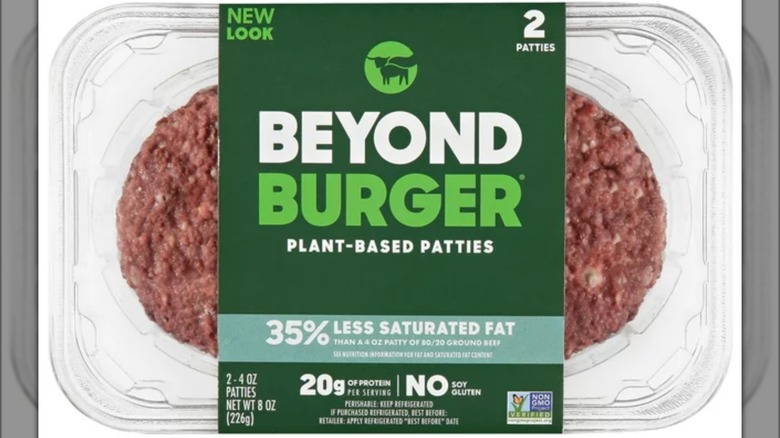14 Of The Unhealthiest Store-Bought Veggie Burgers
It's no secret that vegetarian diets can provide a wealth of health benefits. Removing meat from your diet and embracing plant-based alternatives can result in a higher overall consumption of key vitamins, minerals, and fiber and a lower consumption of saturated fat and cholesterol. This can mean that vegetarians have less risk of several chronic diseases, like type 2 diabetes and certain types of cancer, according to Harvard Health Publishing. Overall, vegetarian groups tend to have a longer lifespan in comparison to the general population, according to a review published in the Proceedings of the Nutrition Society.
However, this is all relative. As demand for vegetarian alternatives to meat has shot up, food companies have responded with endless products — and some of these products really aren't that good for you, making it entirely possible to be a vegetarian and still eat unhealthily. One of the most widely available of these products is the humble veggie burger. While some veggie burgers can be relatively healthy, others are highly processed, containing high amounts of salt and additives, while seriously lacking in protein. In our list, we rounded up the veggie burgers with the highest sodium and lowest protein contents while assessing products for any additional ingredients that might cause concern.
1. Meatless Farm Plant-Based Burgers
Meatless Farm is a great choice for folks who want to make ethical choices, with the British company championing a sustainable process that's environment- and animal-friendly. However, that doesn't mean that its food is very healthy. Its Plant-Based Burgers may be high in protein and fiber, but they're also relatively high in sodium. In each 100 grams of product, these burgers have 1.24 grams of salt, which equates to roughly 480 milligrams of sodium. Given that each patty is approximately 113 grams, you're looking at about 540 milligrams of sodium per serving, almost a quarter of your daily value.
Excessive salt content is a longstanding issue in plant-based products, with vegetarian alternatives routinely having higher sodium levels than their meat-based counterparts. This sodium boosts the flavor of veggie food items, but in doing so, it can cancel out any health benefits that switching to plant-based foods can have. "Unhealthy diets are a leading cause of death and disease globally, and excessive sodium intake is one of the main culprits," says the World Health Organization's director-general, Dr Tedros Adhanom Ghebreyesus. It's estimated that roughly 1.89 million people die yearly due to consuming too much sodium, according to a global report published by WHO.
2. Gardenburger Original Veggie Burger
Gardenburger is a well-known name in the veggie burger space, and its Original Veggie Burger is its flagship product. But that doesn't mean that it's a healthy choice. The Gardenburger Original Veggie Burger is both sodium-rich and protein-poor, making it pretty lacking on the nutrition front, despite being made with healthy food items like rolled oats, brown rice, and button mushrooms. In each burger, there are 490 milligrams of sodium, over 20% of your daily value. As well as this, there are only 5 grams of protein per 71-gram serving.
The smaller serving size and lower protein count mean that this burger is unlikely to fill you up very much, and instead, most of its bulk comes from carbs. For comparison, the average three-ounce patty made from ground beef has almost 21 grams of protein, making it a more satisfying choice. This is why it's an error to assume that swapping meat-based products for vegetarian alternatives will give you the same nutrition and why you should always keep a close eye on your protein levels when following a plant-based diet as recommended by Eufic.
3. Dr. Praeger's Korean Veggie Burger
One of the best things about veggie burgers is that because they use fairly neutral-tasting plant protein, they tend to be incredibly versatile flavor-wise. This is an advantage that frozen food producer Dr. Praeger's has utilized when creating its veggie burger range, with a selection of innovatively-flavored options, including its Korean Veggie Burgers.
But while this burger might pack a spicy punch, thanks to its gochujang sauce, it's not very nutritious. The main issue with this burger is its almost total lack of protein. In each patty, there are just 3 grams of plant protein, which seems to come from the brown rice it's primarily made from. This makes up just 12 of its 150 calories, with the rest coming from fat and carbohydrates.
Adults generally need around 46 to 56 grams of protein daily to keep their bodies functioning correctly, as an article on WebMD, medically reviewed by Mahammad Juber, MD, recommends. Protein makes up a huge amount of your body tissue and plays a vital role in energy production and immune system function. If you're eating this burger as one of your main meals, it's a missed opportunity to maintain your protein intake, leaving you having to find it elsewhere in your diet — and feeling pretty hungry.
4. MorningStar Farms Grillers Prime Veggie Burger
MorningStar Farms has a dizzying range of vegetarian alternatives, including veggie sausages, breakfast patties, and faux chicken products. But its burgers are arguably its most popular, and its Grillers Prime Veggie Burger, at first glance, looks pretty impressive, with 16 grams of protein and a low amount of saturated fat.
But upon closer inspection, things start to fall apart. This burger seems to be made almost entirely from processed ingredients and additives, which leaves it lacking in important vitamins and minerals. There's also a fair amount of sodium in each burger, with 400 milligrams in each 71-gram patty — these two things give it the hallmarks of being an ultra-processed food.
The rise of ultra-processed vegetarian and vegan foods has gotten more drastic in recent years due to advances in food technology, and this has led to more and more people following plant-based diets and making poor dietary choices. According to a study published in The Journal of Nutrition, the more people avoid meat products, the more they tend to have diets high in ultra-processed foods. By choosing a veggie burger like this one instead of one made with fewer processed ingredients or more nutritious qualities, you're missing an opportunity to make your diet healthier.
5. Gardenburger Black Bean Chipotle Veggie Burger
Beans are a superb plant-based protein choice. Not only are they full of amino acids, but they're also low in fat and saturated fat and high in fiber and important nutrients, making them a perfect way to maintain protein consumption while still making healthy choices, according to Medical News Today. So it makes sense to do what Gardenburger did and make a veggie burger out of them.
The only problem with Gardenburger's Black Bean Chipotle Veggie Burger is that it has barely any plant-based protein. Each patty has just 5 grams of protein, making it a fairly low-protein option as far as veggie burgers are concerned. Judging by the order of its ingredients, it's made up way more heavily of brown rice — which, while good for you, is not as high in protein as black beans.
The burger does gain a slightly higher fiber content from its beans, but it also suffers from having a substantial amount of sodium, with 390 milligrams per patty. This product also appears to be pretty heavily processed, with a long ingredients list. While this isn't necessarily bad in itself, it's usually the case that smaller ingredient lists lead to a healthier product, according to Houston Methodist.
6. Dr. Praeger's Tex Mex Veggie Burger
Dr. Praeger's Tex Mex Veggie Burger is a great choice for people who want their vegetarian burgers to have a bit more spice in them, thanks to the addition of jalapeño peppers and chili powder. But they're not the best option for a satisfying, healthy burger. This veggie burger has just 5 grams of protein, meaning it won't contribute much to your body's cellular functions or help build muscle like a different high-protein burger might, according to Medline Plus.
While its 6 grams of fiber is pretty impressive and may help to keep you from getting hungry quickly after eating it, eating high fiber without high protein to accompany it may not be as beneficial as consuming appropriate amounts of both, as recommended by Community Health Network. As well as this, this burger is on the lower end of the calorie scale, with 130 calories per patty, which may contribute to it being less filling and satisfying than other veggie burger options — and when it's paired with a floury bun, it may see you consuming a fairly carb-centric meal.
7. Everything Legendary Burger
The Everything Legendary Burger is a very modern veggie option. Instead of serving up dry, grainy veggie patties, Everything Legendary specializes in making flavor-rich plant-based options that look and taste like the real thing. But while its patties could pass for real beef, they also have some notable nutritional issues, including high sodium and saturated fat levels.
With almost 500 milligrams of sodium per patty, the Everything Legendary Burger is one of the saltiest options on the market. And while its 4 grams of saturated fat may make it juicy, it also makes it a less-healthy option. Vegetarian and plant-based meal plans are traditionally lower in saturated fat than meat-based ones, but there's been a gradual rise in saturated fat consumption in these diets over the years, thanks to the higher use of coconut oil in vegan foods. This oil is one of the first ingredients listed in the Everything Legendary Burger. And it's worth remembering that just because coconut oil provides plant-based saturated fat, that doesn't mean that it's better for you than the animal-based kind, according to the British Heart Foundation. It's far better to consume unsaturated fat sources wherever possible and eat saturated fat-heavy foods like this burger in moderation.
8. Amy's Organic California Veggie Burger
When something's branded as organic and veggie, it's hardly controversial to assume it's healthy. So it's a real shame that Amy's Organic California Veggie Burger is one of the least nutritious options out there. The main issue with this veggie burger is its enormous sodium content. With 550 milligrams of sodium in each 71-gram patty, it is, gram-for-gram, the saltiest vegetarian burger on our list.
In addition to this, Amy's Organic California Veggie Burger is a lower-protein option and has just 6 grams per patty. It's a shame that its nutritional content isn't slightly more impressive, given that its ingredients list, with every item in the burgers coming from an organic source, seems to indicate that it's been made with care, love, and attention. But it's critical to remember that just because something is organic doesn't make it a healthier choice. Organic produce is food that's been made without any artificial or aggressive farming techniques to improve its quality or hardiness. And while some organic foods may be marginally higher in nutrients, it's entirely possible for them to also be unhealthy, especially when combined with high levels of salt, warns Harvard School of Public Health.
9. Gardenburger Portabella Veggie Burger
Portobello mushrooms, with their wide, flat cap and juicy, slightly meaty taste, have long been used as a vegetarian substitute for burger patties. And while it's pretty easy to just make your own by grabbing some portobello caps and marinating them, food producers like Gardenburger have stepped it up a notch by combining the mushrooms with other ingredients like mozzarella cheese and brown rice to create the Gardenburger Portabella Veggie Burger.
Regrettably, though, this burger is not the better for it. Each Gardenburger Portabella Veggie Burger has 450 milligrams of sodium, 19% of your daily value, and a mere 4 grams of protein. It also contains a small quantity of saturated fat — and while there's only 1 gram per burger, it's more than you'd get if you made your own portobello burger from scratch. It's useful to remember, too, that this sodium content is before you add any other ingredients into the mix, like additional cheese, sauces, and burger buns, which can be pretty salty in their own right. And while this burger contains way more fiber than you'd get by just grilling a mushroom and putting it in your bread, the sodium content doesn't justify it.
10. Dr. Praeger's California Gluten Free Veggie Burger
Finding gluten-free veggie burgers can be pretty challenging. A large number of the options available on the market contain wheat, thanks to either the presence of wheat gluten, wheat flour, or binders like breadcrumbs. So it's pretty exciting to see a product like Dr. Praeger's California Gluten Free Veggie Burger, which gets its bulk from vegetables like carrots, onions, zucchini, and oat bran and is held together by corn starch and arrowroot powder.
However, the combination of these ingredients is at the expense of the protein content in each patty. There are just 3 grams of protein in each burger, making it one of the least nutritious products on our list. It's important to remember that wheat products don't just provide bulk in veggie burgers but protein, too. Wheat gluten, also known as seitan, is a common high-protein meat alternative, which texturally is similar to beef when used in a patty. Dr. Praeger's California Gluten Free Veggie Burger is also lacking in any significant vitamin or mineral content, with barely any calcium, potassium, or iron — and while it only has 120 calories, that plus its lack of protein means that you'll probably be hungry pretty soon after chomping it down.
11. Impossible Burger
Impossible Foods changed the game when it came out with its burger meat. With an appearance that is virtually indistinguishable from ground beef, the ruby-red meat alternative is also super-high in protein and contains no cholesterol whatsoever. There are, though, still a few issues with the Impossible Burger. The product is fairly high in sodium, containing 370 milligrams in each 113-gram serving. More worrying, though, is the saturated fat content. Each patty contains 6 grams of saturated fat, thanks to coconut oil — and although this is lower than the amount you'd get in a regular burger patty, it's still 30% of your daily value in one go.
We're also not overjoyed by the presence of methylcellulose in the Impossible Burger. Methylcellulose shows up in several veggie burgers, which is used as a thickening agent and binder. However, this additive, derived from wood pulp, can have some drawbacks. Not only does methylcellulose act as a laxative if consumed in high quantities, according to Healthline, but consuming it long-term may prove harmful to your good gut bacteria, according to research in the journal Gastroenterology. Crucially, this only seemed to be the case when consuming high levels of the additive — but if you're eating multiple veggie products daily with it included, it's worth keeping in mind.
12. MorningStar Farms Tomato & Basil Pizza Burgers
Ever wanted to combine a pizza with a burger but do so in a vegetarian-friendly way? MorningStar Farms has you covered. The food company has made the ultimate veggie mash-up with its Tomato & Basil Pizza Burgers, mixing tomato paste, herbs, garlic, and vegan cheese with soy protein concentrate in one single patty.
However, this hybrid product takes a lot of processing to come together effectively. Its ingredient list is extensive, containing items like modified food starch, a low-quality additive that often comes from genetically modified sources. Genetically modified foods are regulated by the FDA and are generally considered safe, with no evidence of their harm to humans, according to Medical News Today. However, long-term effects have yet to be fully determined, and it's worth keeping the potential origins of modified food starch in mind if you're trying to eat organic produce. MorningStar Farms Tomato & Basil Pizza Burgers contain methylcellulose and also have a slightly higher saturated fat content than other veggie burgers on the market, with 1.5 grams per serving.
13. Qrunch Quinoa Burgers, Sweet Curry with Lentils
Normally, we love anything made with quinoa. The ancient whole grain is almost absurdly nutritious, containing loads of protein, fiber, B vitamins, and iron. So a burger made from quinoa should be a safe bet — but Qrunch Quinoa Burgers, made with lentils with a sweet curry flavor, are anything but. These burgers, created by Colorado-based Qrunch Organics, aren't exactly bad for you. But considering their source grain's nutrition, they have a fairly low protein and fiber content. Each burger patty has 4 grams of protein and just 3 grams of fiber, which is lower than many other veggie burgers.
In addition, Qrunch Quinoa Burgers have way higher saturated fat content than many veggie burger alternatives. With 2.5 grams per patty, they have just over 12% of your daily value. Thanks to the grains used, it also has 25 grams of carbohydrates, again much more than a lot of plant-based burgers on the market. All of this adds up to a burger that has 200 calories in every patty, which we'd like a lot more if there was more protein or fiber in them.
14. Beyond Burger Plant-Based Burger Patties
Much like Impossible Foods, Beyond Meat has been a trailblazer for plant-based meat alternatives that would please even the most committed carnivore. But while these chunky veggie burgers may be picture-perfect imitations of the real things, their nutritional quality is far from perfect. Each Beyond Burger Plant-Based Burger Patty has a large amount of fat and saturated fat in each bite, and every serving has 14 grams of fat and 5 grams of saturated fat. Although Beyond Meat boasts that this is less than the amount you'd get in a regular beef burger, it's higher than the amount you'd get in many other veggie patties.
As the protein in these burgers comes from plant sources, you might also expect the Beyond Burger Plant-Based Burger Patties to have more fiber than they do. But with just 2 grams per portion, they cover just 7% of your daily value. With 390 milligrams of sodium in every patty, these burgers are far from salt-free and contain more sodium than comparable products like the Impossible Burger.
